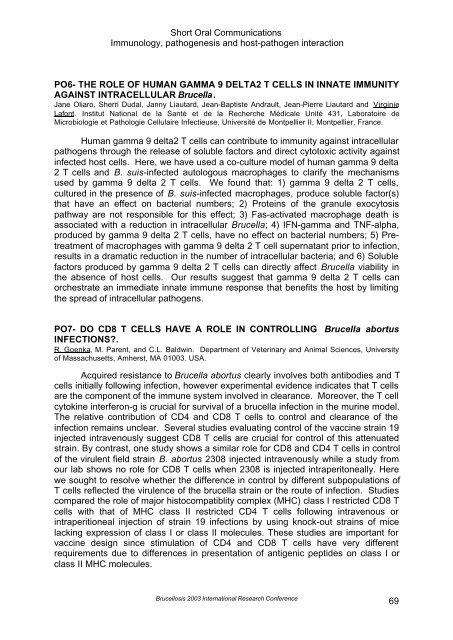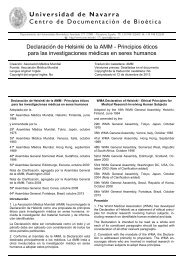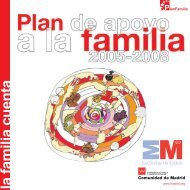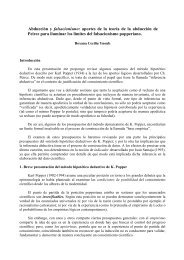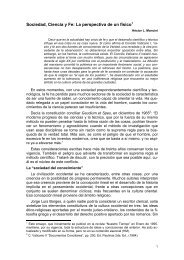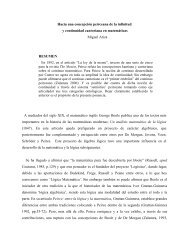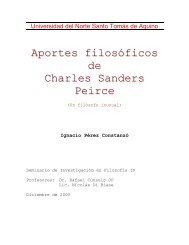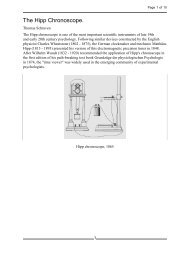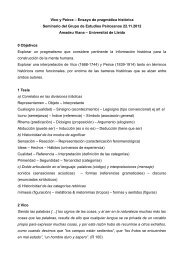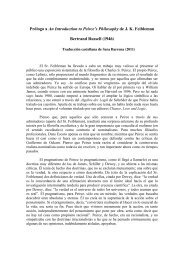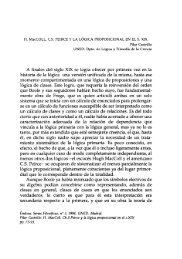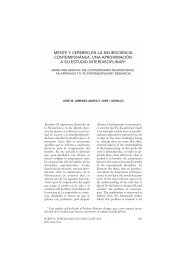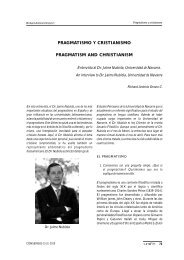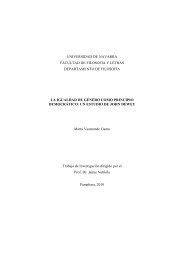Brucellosis 2003 proceedings - PHIDIAS
Brucellosis 2003 proceedings - PHIDIAS
Brucellosis 2003 proceedings - PHIDIAS
Create successful ePaper yourself
Turn your PDF publications into a flip-book with our unique Google optimized e-Paper software.
Short Oral Communications<br />
Immunology, pathogenesis and host-pathogen interaction<br />
PO6- THE ROLE OF HUMAN GAMMA 9 DELTA2 T CELLS IN INNATE IMMUNITY<br />
AGAINST INTRACELLULAR Brucella.<br />
Jane Oliaro, Sherri Dudal, Janny Liautard, Jean-Baptiste Andrault, Jean-Pierre Liautard and Virginie<br />
Lafont. Institut National de la Santé et de la Recherche Médicale Unité 431, Laboratoire de<br />
Microbiologie et Pathologie Cellulaire Infectieuse, Université de Montpellier II, Montpellier, France.<br />
Human gamma 9 delta2 T cells can contribute to immunity against intracellular<br />
pathogens through the release of soluble factors and direct cytotoxic activity against<br />
infected host cells. Here, we have used a co-culture model of human gamma 9 delta<br />
2 T cells and B. suis-infected autologous macrophages to clarify the mechanisms<br />
used by gamma 9 delta 2 T cells. We found that: 1) gamma 9 delta 2 T cells,<br />
cultured in the presence of B. suis-infected macrophages, produce soluble factor(s)<br />
that have an effect on bacterial numbers; 2) Proteins of the granule exocytosis<br />
pathway are not responsible for this effect; 3) Fas-activated macrophage death is<br />
associated with a reduction in intracellular Brucella; 4) IFN-gamma and TNF-alpha,<br />
produced by gamma 9 delta 2 T cells, have no effect on bacterial numbers; 5) Pretreatment<br />
of macrophages with gamma 9 delta 2 T cell supernatant prior to infection,<br />
results in a dramatic reduction in the number of intracellular bacteria; and 6) Soluble<br />
factors produced by gamma 9 delta 2 T cells can directly affect Brucella viability in<br />
the absence of host cells. Our results suggest that gamma 9 delta 2 T cells can<br />
orchestrate an immediate innate immune response that benefits the host by limiting<br />
the spread of intracellular pathogens.<br />
PO7- DO CD8 T CELLS HAVE A ROLE IN CONTROLLING Brucella abortus<br />
INFECTIONS?.<br />
R. Goenka, M. Parent, and C.L. Baldwin. Department of Veterinary and Animal Sciences, University<br />
of Massachusetts, Amherst, MA 01003. USA.<br />
Acquired resistance to Brucella abortus clearly involves both antibodies and T<br />
cells initially following infection, however experimental evidence indicates that T cells<br />
are the component of the immune system involved in clearance. Moreover, the T cell<br />
cytokine interferon-g is crucial for survival of a brucella infection in the murine model.<br />
The relative contribution of CD4 and CD8 T cells to control and clearance of the<br />
infection remains unclear. Several studies evaluating control of the vaccine strain 19<br />
injected intravenously suggest CD8 T cells are crucial for control of this attenuated<br />
strain. By contrast, one study shows a similar role for CD8 and CD4 T cells in control<br />
of the virulent field strain B. abortus 2308 injected intravenously while a study from<br />
our lab shows no role for CD8 T cells when 2308 is injected intraperitoneally. Here<br />
we sought to resolve whether the difference in control by different subpopulations of<br />
T cells reflected the virulence of the brucella strain or the route of infection. Studies<br />
compared the role of major histocompatiblity complex (MHC) class I restricted CD8 T<br />
cells with that of MHC class II restricted CD4 T cells following intravenous or<br />
intraperitioneal injection of strain 19 infections by using knock-out strains of mice<br />
lacking expression of class I or class II molecules. These studies are important for<br />
vaccine design since stimulation of CD4 and CD8 T cells have very different<br />
requirements due to differences in presentation of antigenic peptides on class I or<br />
class II MHC molecules.<br />
<strong>Brucellosis</strong> <strong>2003</strong> International Research Conference<br />
69


